About Stride Communication Lab
Every year, nearly 800,000 people have a stroke. For people who survive their strokes, the consequences can be devastating. Strokes can affect people’s ability to work, take care of themselves or their loved ones, make and keep meaningful relationships, communicate, and even eat. Many survivors and their families talk about “life after stroke” and the many challenges they face on their road to recovery. Strokes can take a massive toll on individuals and families, so we need as many resources, services, and research studies as possible to help people do more than just survive. The StrIDE Communication Lab aims to help stroke survivors thrive.
Who are we?
We are West Chester University students and faculty dedicated to supporting and working with stroke survivors in the tri-state area (PA, NJ, DE). Reva M. Zimmerman, PhD CCC-SLP, is the founder and director of the Lab.
What do we do?
Our lab is new, but eventually we want to create a hub in West Chester for stroke survivors (and their loved ones) who are looking for rehabilitation, resources, and research opportunities.
What does "StrIDE Communication" mean?
Stroke, Inclusion, Diversity, and Equity. We want to create a community that is open and welcoming for stroke survivors with all levels of functioning, all racial and language backgrounds, and all levels of social support. We focus on disorders that impact communication - such as aphasia, apraxia, dysarthria, and cognitive changes - but all stroke survivors and their loved ones are welcome.
Where can I learn more? How do I get involved with the Lab?
Follow the links below to learn more about:
For questions, you can contact the StrIDE Communication Lab directly. Call us at 610-436-2588 or email us at stridelab@wcupa.edu.
PEOPLE
Lab Director
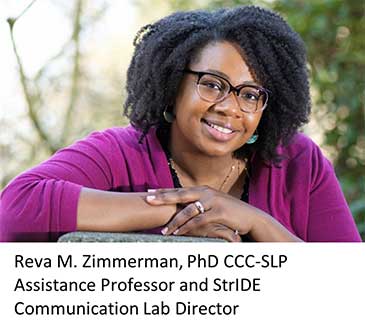
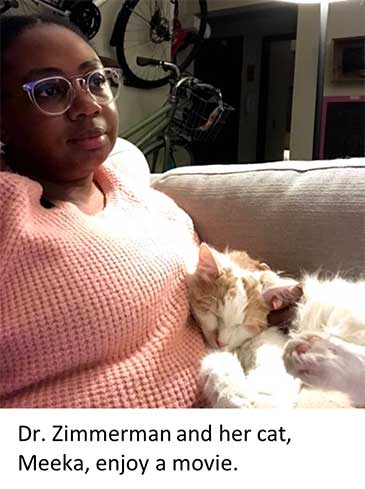
Reva M. Zimmerman, PhD CCC-SLP
Dr. Zimmerman grew up in Seattle, WA. She received her BA in Linguistics and BS in Speech and Hearing Sciences from the University of Washington (UW) in 2010. She then moved to Vancouver, Canada, to pursue her MS in Speech-Language Pathology at the University of British Columbia (UBC). Canada is where she became interested in aphasia and she got involved in Vancouver’s aphasia community, including the Sea to Sky Aphasia Camp and the UBC Aphasia Mentorship Program. When she graduated from UBC in 2012, she moved back to Washington and volunteered at the Puget Sound Veteran’s Administration and the Young Adult Stroke Survivor support group. She also worked as a speech therapist for adults with acquired disorders of cognition, swallowing, language, speech, and voice.
Although she enjoyed her clinical work, Dr. Zimmerman still had questions about how best to support people with aphasia, so she joined the UW Aphasia Lab as a doctoral student with Dr. Diane Kendall in 2016. During her PhD program, Dr. Zimmerman studied cognitive and language processing in aphasia, and she wrote her thesis on pre-treatment abilities that may influence how well people respond to aphasia therapy. She defended her dissertation in December 2020.
Dr. Zimmerman joined the Communication Sciences and Disorders (CSD) faculty at WCU in January 2021. In her role at WCU, Dr. Zimmerman teaches undergraduate and graduate courses, supervises speech-language pathology students in the WCU Speech and Hearing Clinic, and conducts research about stroke, aphasia, and teaching in CSD.
In her free time, Dr. Zimmerman enjoys spending time with her husband, daughter, and cat. She also likes to watch movies, read, and – like a true Seattleite – drink good coffee.
Link to CV PDF: Curriculum Vita
Students
Several undergraduate and graduate students participate in the StrIDE Communication Lab as journal club members, co-authors on research, and student assistants on research projects. If you are interested in joining the StrIDE Communication Lab, please visit the page For Students to find out more about becoming involved.
Master Students
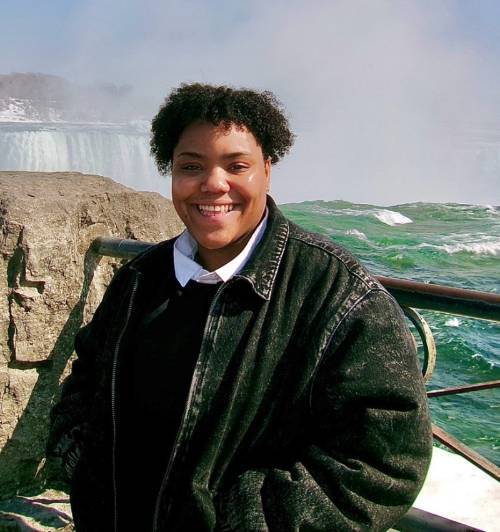
Kimorah M. Gonzalez, BA
Kimorah grew up in Scranton, PA. She received her B.A. in Communication Sciences and Disorders, along with a minor in American Sign Language (ASL) from West Chester University of Pennsylvania (WCU) in 2025. She is currently a Graduate Assistant for Dr. Zimmerman while pursing her MA in Speech-Language Pathology at WCU as well. Kimorah’s special intrests include Adult Motor Speech Disorders and Adult Language Disorders aquired from damage or interuption to the nervous system and the common causes of this neurological damage such as strokes, traumatic brain injury (TBI), and most specifically progressive conditions like Parkinson’s and multiple sclerosis. She looks forward to collaborating with The Aphasia Resource Collaboration Hub (ARCH) with their Annual Resource Orientation for Stroke & Aphasia (ROSA), and hopes to continue expanding her knowledge and interests within the field of Speech-Language Pathology.
In her freetime, Kimorah loves to try new resturants, watch movies with friends, and cook with her partner.

Sierra Smith, BS
Sierra grew up in York, PA. She received her BS in Communication Sciences and Disorders, along with a minor in Spanish, from The Pennsylvania State University in 2023. After a gap year during which she studied abroad and worked as a substitute teacher with a focus on Autism Support classrooms, she moved to West Chester, Pennsylvania, to pursue her MA in Speech-Language Pathology at West Chester University. Sierra has a special interest in augmentative and alternative communication (AAC) and autism spectrum disorder due to her time spent within the special education system. However, her first love is the subject of bilingual language learners. She hopes to use her involvement within the program’s Bilingual Emphasis Course as a foundation to become a bilingual speech-language pathologist herself. Sierra seeks to use her experiences to strengthen her cultural and linguistic competency, as well as to apply best practices in her work with underrepresented and underserved populations. She looks forward to working with the StrIDE team and expanding her interests into the realm of neurological disorders.
Sierra’s hobbies include dancing salsa and bachata, going for walks, and watching movies with friends and family. She also loves to travel, and has hopes to live in Mexico one day in order to become fluent in Spanish.
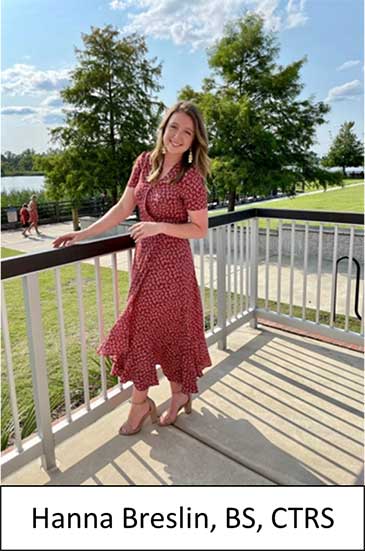
Hanna Breslin, MA, CF-SLP, CTRS
Hanna grew up in Ardmore, Pennsylvania. She received her BS in recreational therapy from Old Dominion University, where she played division 1 lacrosse. Since graduating in 2019, Hanna has worked as an outpatient cognitive therapist for people with traumatic brain injuries. Hanna has many interests in the speech-language pathology realm, primarily aphasia, and disorders related to traumatic brain injuries. She is a co-author with Dr. Zimmerman and Dr. Rebecca Hunting Pompon (University of Delaware) on a scoping review project, Baseline cognitive and psychosocial characteristics as predictors of aphasia treatment response: A scoping review. Hanna graduated with her Master's of Arts in Speech-Language Pathology in 2024.
In her free time, she enjoys cooking, spending time with friends and family, and coaching.

Abigail Kissell, MA CF-SLP
Abigail grew up in State College, Pennsylvania. She received her BS in Communication Sciences and Disorders from The Pennsylvania State University in 2022. She graduated from West Chester University of Pennsylvania with her MA in Speech-Language Pathology in 2024. She was a Graduate Assistant for Dr. Zimmerman. Abigail has always wanted to help others and as the ability to communicate is so important to her, it led her to her current career path. Within the field, Abigail is most interested in Aphasia and Traumatic Brain Injuries and the speech consequences that follow those events. In her free time, Abigail likes to spend her time traveling, reading, cooking or baking, and spending time with loved ones.
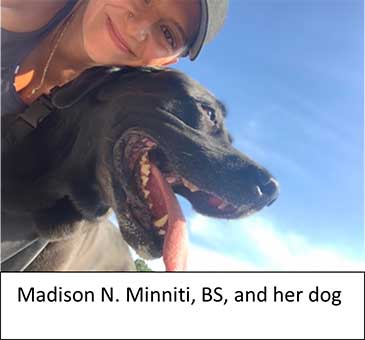
Madison N. Minniti, MA CCC-SLP
Madison grew up in Coatesville, PA. She received her BS Communication Sciences and Disorders from The Pennsylvania State University, with a minor in Human Development in 2021. She then moved back home to pursue her MS in Speech Language Pathology at West Chester University of Pennsylvania, which she is currently halfway through.
Madison became interested in aphasia when her great-aunt had a stroke in 2017. Seeing the toll that the stroke took on her family was devastating. Madison saw how much of an impact the speech-language pathologist made in her great-aunt's life and decided that she wanted to make an impact on others' lives, too. The neurological side of speech-language pathology has always interested Madison the most out of all of her curriculum. She decided to join this research team to gain more knowledge about aphasia to provide excellent care and be an advocate for people with aphasia. She is currently a co-author with Dr. Zimmerman and Dr. Rebecca Hunting Pompon (University of Delaware) on a scoping review project, Baseline cognitive and psychosocial characteristics as predictors of aphasia treatment response: A scoping review. Madison graduated with her Master's of Arts in Speech-Language Pathology in 2023.
In her free time, Madison enjoys spending time with her family, friends, boyfriend, dogs, and cats. She also enjoys traveling to new places.
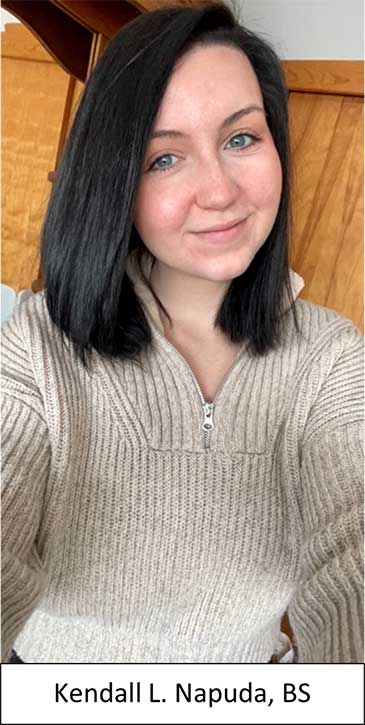
Kendall L. Napuda, MA, CCC-SLP
Kendall grew up in Pennsville, NJ. She received her BS in Communication Sciences and Disorders at Bloomsburg University of Pennsylvania in 2021. After finishing her bachelor’s degree, she moved to West Chester, Pennsylvania to pursue her MA in Speech-Language Pathology at West Chester University of Pennsylvania (WCU). Kendall has always been interested in the medical aspect of speech-language pathology. She found her passion to be cognitive and language processing in aphasia after attending an aphasia seminar during her first year at Bloomsburg. Since then, Kendall has spent time learning more about aphasia as well as her other interest, apraxia. Kendall is deeply passionate about her desire to help rehabilitate those diagnosed with aphasia and apraxia. Shortly after starting at WCU, Kendall and Dr. Zimmerman started the Aphasia Journal Club. During meetings led by Dr. Zimmerman, journal articles were discussed involving the theories behind cognitive and language processing in aphasia as well as cultural aspects associated with the success and timeliness of rehabilitation. After graduating from WCU in 2023, Kendall got a job where she can finally pursue her passion of improving the quality of life for those who have speech and language needs. She co-authored a project in the StrIDE Communication Lab, Exploring Treatment Seeking Decisions at Stroke Onset.
In her free time, Kendall spends time with her family and friends. She loves to be outdoors and enjoys hiking and backpacking. She also likes to read, draw, and watch documentaries.

Arielle Segal, MA
Arielle grew up in Richboro, Pennsylvania. She received her BS in Communication Sciences and Disorder from The Pennsylvania State University in 2021. She earned her MA in Speech-Language Pathology from West Chester University of Pennsylvania (WCU) in 2023. Arielle co-authored two projects during her time at WCU: Baseline cognitive and psychosocial characteristics as predictors of aphasia treatment response: A scoping review and Understanding treatment-seeking decisions at stroke onset. Arielle has always been passionate about helping others improve their quality of life which led her to this career path. Within the field, Arielle’s specific interests lie in the areas of aphasia, articulation, and swallowing. In her free time, Arielle enjoys spending time with her family and friends, traveling, and spending time on the beach.
Bachelors Students
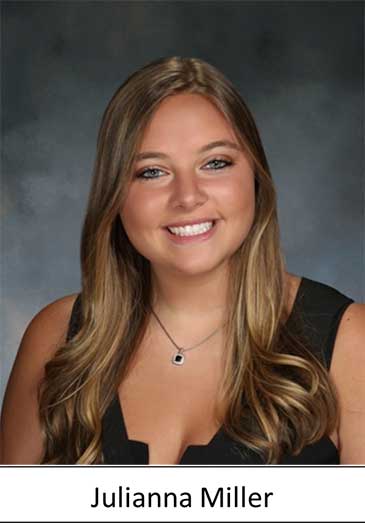
Julianna Miller, BA
Julianna grew up in Warren, NJ. She graduated from West Chester University in 2024 with a Bachelor's in Communication Sciences and Disorders and a double minor in Autism Education and Spanish. She is currently earning hear Master's in Speech-Language Pathology at Seton Hall University.
In 2019, Julianna lost her grandfather to encephalitis. The infection in his brain caused him to suffer from aphasia. Julianna had a very meaningful connection to her grandfather so, for this reason, she decided to follow a career path in speech-language pathology. After having Dr. Zimmerman as a professor and learning about her research, Julianna has devoted her time to learning more about aphasia, how to treat it, and how it affects people. She is currently a student research assistant on a project in the StrIDE Communication Lab, Exploring Treatment Seeking Decisions at Stroke Onset.
In her free time, Julianna enjoys spending time with her family and friends. She loves to shop and travel to new places.
